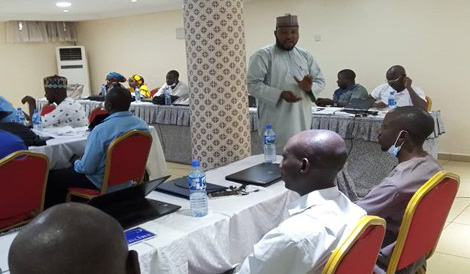HSDF Supports Local Technical Assistants (LTAs) in Kaduna State Towards Achieving Credible Data for Informed Decision Making
The National Health Management Information System (NHMIS) is the system for the collection, collation, storage, and dissemination of service delivery data in the Nigerian healthcare system. It provides information on routine health service delivery and the health system that supports it in a timely and reliable manner.
To ensure data quality, the NHMIS provided data quality measurements using availability, consistency, and validity as minimum requirements.
The LTA intervention adopted the national electronic Data Quality Assessment (DQA) tool and deployed an abridged Data Demand & Use (DDU) tool to assess the quality of data and its use at the community, facility, and Local Government Area (LGA) levels in Kaduna State.
Assessments and interactions with facilities in the State revealed huge gaps that needed to be addressed. Reactive efforts, such as the Integrated Data Control Room (IDCR), routine Data Quality Assessment (DQA), LGA data validation meetings and Integrated Supportive Supervision (ISS) to addressing these gaps did not yield the desired results. More so, an analysis of the Kaduna State routine health information system across the organizational, technical and behavioral determinants revealed huge gaps at all levels.
The LTA Intervention
Having explored the reactive interventions listed above, the LTA intervention was introduced in October 2020 as a proactive approach to mitigating gaps at the point of data generation and creating a culture of data demand and use at the facility, community and LGA levels. All these aimed at promoting health data governance and accountability at all levels.

Local Technical Assistants provide close support, hand-holding and mentoring to health facility In-Charges, Medical Record Officers (MROs), LGA Health Management Information System Officers (HMISOs) and Monitoring & Evaluation (M&E) Officers on NHMIS data management. They participate in data management and review meetings at facility, community, LGA and state level, providing feedback on lessons learned, challenges encountered, and best practices identified from the field.

The LTAs are working across the 255 priority PHCs (One PHC per ward) in the 23 LGAs of Kaduna State to ensure and provide close support, hand-holding and mentoring to health facility In-Charges, MROs, LGA HMISOs and M&E Officers on NHMIS data management.
How HSDF’s support has impacted the LTA intervention
Health Strategy and Delivery Foundation (HSDF), provides technical support to the Kaduna State Primary Health Care Board (SPHCB) on LTA intervention by giving expert advice, monitoring the implementation of field work, and confirming all activities are aligned with the intervention’s results framework. This is geared towards ensuring credible data is used for decision making in the state.

HSDF’s representative conducting a refresher training to LGA HMISOs on eDQA & DDU tool HSDF representative (first left),Executive Secretary, Kaduna SPHCB, Dr Hamza Abubakar (second left) & other stakeholders during a monthly update meeting
The Local Technical Assistants have worked across the 255 priority PHC facilities in the 23 LGAs of Kaduna State applying DQA, Data Demand and Use (DDU) and mentoring facility OICs and staff on NHMIS tools through daily facility visits. Local Technical Assistants share and discuss the analyzed results of the DDU tool with facility heads & staff, highlighting the need to use data for decision making. After that, they develop an immediate action plan for areas of weaknesses to be addressed in the current reporting month.

DQA score in April 2021 92.5% supersedes preceding months of March 89.6%, February 89.4%, January 85.0%, December 83.6%, November 82.6%, October 78.2%, September 72.3%, August 67.0%, July 63.6% retrospectively
Since its inception in October 2020, there has been an upward trend in overall Data Quality Assessment performance in the 255 priority PHCS in Kaduna state from July 2020 – April 2021.

The DDU started out at 59% in September 2020 and progressed to 83% in June 2021. This was because of persistent follow-up on the use of data for decision making at facility level by the LTAs across the 23 LGAs.
At baseline, the state’s overall performance on DQA was 63.6% while DDU baseline was established at 59%. Over the period, the LTAs intervention has ensured steady rise in the overall DQA & DDU performance in the state.


Figure 2: Baseline comparison versus progress on eDQA scores after ten months of proactive intervention (July 2020 to April 2021)
Grants and Business Development Specialist
We are seeking a highly motivated and experienced Grants and Business Development Specialist to join our organization. The successful candidate will be responsible for identifying funding opportunities, developing grant proposals, and fostering partnerships with potential donors and stakeholders (regional and global). This role plays a vital part in securing funds and resources to support our organization’s mission and projects.
Apply NowPublic Health Consultant, Guinea
The consultant (working with the Accelerator team) will collect results from the tool, organize a meeting with stakeholders to discuss results from the tool, and produce a report on key findings and recommendations from the tool to be shared publicly.
Apply NowPublic Health Associate, Senegal
We are currently in search of an experienced Public Health professional in Senegal to work on the anticipated Nutrition Capacity Development and Financing Platform and provide technical assistance to elevate nutrition financing and strengthen local capacity to support these efforts. The Associate must be bilingual (English and French).
Apply Now